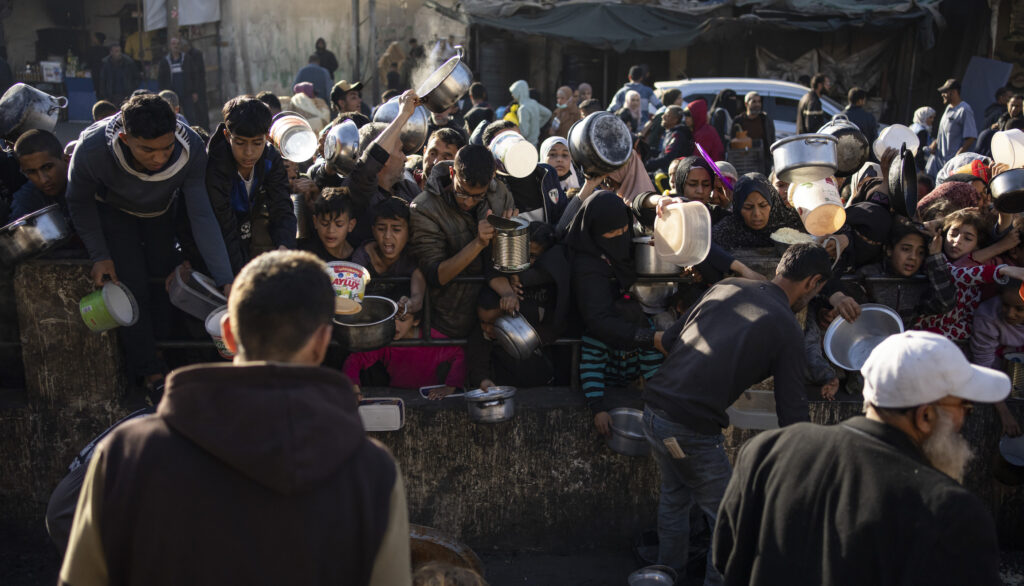A Hamas commander was the target of an Israeli airstrike at a United Nations food distribution center in Rafah, Gaza, that reportedly killed at least five people on Wednesday.
The IDF said Muhammad Abu Hasna was “precisely targeted and eliminated in the area of Rafah,” while the United Nations Relief and Works Agency for Palestinians said that one of its staff members was killed and 22 others were injured.
“Muhammad Abu Hasna, a commander in Hamas’ Operations Unit, was precisely targeted and eliminated in the area of Rafah,” the IDF explained. “Among other terrorist activities, Hasna was involved in taking control of humanitarian aid and distributing it to Hamas operatives.”
Israeli officials said he was “involved in taking over the humanitarian aid equipment and distributing it to Hamas operatives,” and claimed he “was in charge of an intelligence command whose purpose was to give reports on IDF forces in preparation for attacks against them.”
The head of UNRWA called for an independent inquiry into the strike and others that have killed UNRWA employees and destroyed U.N. buildings.
“Today’s attack on one of the very few remaining UNRWA distribution centres in the Gaza Strip comes as food supplies are running out, hunger is widespread and, in some areas, turning into famine. Every day, we share the coordinates of all our facilities across the Gaza Strip with parties to the conflict. The Israeli Army received the coordinates including of this facility yesterday,” UNRWA Commissioner-General Philippe Lazzarini said.
“The United Nations, its personnel, premises and assets must be protected at all times. Since this war began, attacks against UN facilities, convoys and personnel have become commonplace in blatant disregard to international humanitarian law,” he added. “I am calling once again for an independent inquiry into these violations and the need for accountability.”
Israel has alleged that several UNRWA employees participated in the Oct. 7 terrorist attacks that sparked the current iteration of the war. The allegation prompted more than a dozen countries to halt their funding for UNRWA, even as the humanitarian situation in Gaza has continued to worsen.
In total, 16 countries paused their funding, which totaled $450 million, but Canada and Sweden have since resumed.
Earlier this month, Israeli military spokesman Daniel Hagari said that roughly 450 UNRWA employees had ties with Hamas and any other Gazan terrorist groups. They had previously accused 12 of participating in the attack, 10 of whom were fired at the time while the other two had died, and the U.N. has multiple investigations ongoing.
Rafah, where the strike occurred, is along the Gaza-Egyptian border and is the last city Israel has yet to clear in their efforts to demilitarize Hamas. More than 1 million Palestinians are sheltering in the city, however, after the Israeli military urged them to flee south earlier in the conflict.

President Joe Biden has said he does not support full-scale Israeli military operations in Rafah without significant accounting for the civilian population in the area. The U.S. has not seen an Israeli plan to account for them yet.
“We’ve made clear our concerns about an operation in Rafah, we’ve made clear our concerns about the fact that an operation would put an enormous number of civilians at risk, and we have not seen a credible plan to protect those civilians,” Jake Sullivan, Biden’s national security adviser, told reporters this week.
Various international leaders have warned about the catastrophic conditions within Gaza and said they would continue to worsen without an increase in aid. The issue is not only with getting aid to Gaza’s borders but also the distribution of the aid to civilians and the prevention of its seizure by Hamas.
CLICK HERE TO READ MORE FROM THE WASHINGTON EXAMINER
Leaders have called on Israel to open additional crossings from Israel into Gaza, specifically in the north where the threat of famine is most acute. The World Food Programme got a small aid convoy through a northern crossing this week for the first time.
Also on Thursday, the first aid shipment to get to Gaza via the Mediterranean Sea arrived. Biden announced last week that the U.S. military would build a port off Gaza’s coast to facilitate a new path for aid to come in. It will take about two months to become operational.
